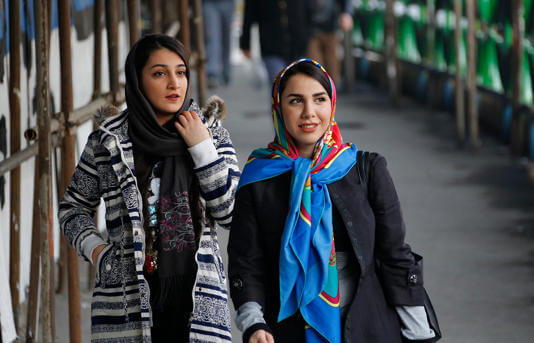Over the weekend, Iran’s police officials announced new measures to rein in the growing number of young women defying the regime's compulsory Islamic dress code, placing security cameras in public places to find and penalize unveiled women.
According to media reports, police officials said that once unveiled women have been identified, they will receive text messages that warn of severe consequences.
In a public statement by the Islamic Republic of Iran's judiciary news agency Mizan and other state media, officials said that the action by the regime is aimed at "preventing resistance against the hijab law."
"The installment of cameras demonstrates that the Islamic Republic has no intention of loosening its totalitarian dress codes, including the compulsory hijab for women," said Alireza Nader, engagement director for the National Union for Democracy in Iran (NUFDI).
"The regime fears that women resisting the hijab will lead to greater resistance to its control of all of society. But no matter what the regime does, its efforts will fail," he said.
Following the death of 22-year-old Mahsa Amini at the hands of the regime's morality police over her hijab wear, Iranian men and women rallied behind the young woman's death, taking to the streets to protest the ayatollahs and calling for the regime's complete overthrow.
As protests continued on the streets, the Islamic Republic deployed security forces to put down the movement by arresting, torturing, and killing ordinary individuals who spoke out against the regime. Despite the brutal suppression, women in Iran continue to defy the obligatory dress code, with many being unveiled in malls, restaurants, shops, and streets throughout the country.
In response to the defiance by so many women, the regime has called on its supporters to harass and report women who defy the obligatory dress code and have resorted to creating new measures like freezing bank accounts for those who do not comply.
Throughout schools in Iran, dozens of female students were taken ill following a wave of suspected poisonings from pro-regime groups, affecting hundreds of unveiled schoolgirls. In response to the poisoning, regime authorities have accused opponents of the Islamic Republic of using the attacks to undermine the regime and its clerical rulers. Despite the wave of poisonings, police officials continued to call on business owners and schoolteachers to "seriously monitor the observance of societal norms with their diligent inspections."
In late March, an official statement from the Islamic Republic of Iran's Interior Ministry called the veil "one of the civilizational foundations of the Iranian nation" and “one of the practical principles of the Islamic Republic."
Iranian Supreme Leader Ayatollah Ali Khamenei echoed similar statements, calling the hijab a critical aspect of the Islamic Republic, and blaming the West and Israel for supporting protests to overthrow the regime.
"The people of Iran have had enough of the compulsory hijab and enough of the Islamic Republic. They will not stop their resistance until this regime is gone," Nader told The Foreign Desk.
Related Story: Iran Regime Poisons Female Students for Protesting









